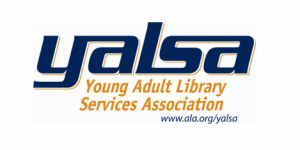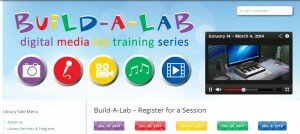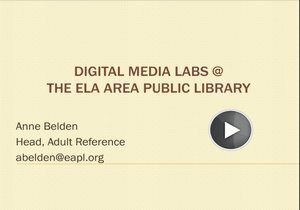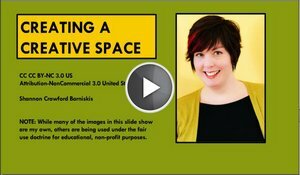 Funding for the YouCreate Lab was provided by a grant from the Institute of Museum and Library Services through the Library Services and Technology Act, administered by the Utah State Library, Park City Municipality and by the Friends of the Park City Library.
Funding for the YouCreate Lab was provided by a grant from the Institute of Museum and Library Services through the Library Services and Technology Act, administered by the Utah State Library, Park City Municipality and by the Friends of the Park City Library.
Part Two: Vision to Action
Vision without action is merely a dream. Action without vision just passes the time. Vision with action can change the world — Joel Arthur Baker
Research and Funding: Know Your Ask
In January 2012, Heather Reynolds, the pervious Youth Services Librarian attended a webinar presented by Skokie Public Library on creating a digital media lab. This was the spark, which lead to a budget request by former Library Director, Linda Tillson. Digital media labs are fairly new and not a traditional component of libraries; however, Park City Municipality recognized the need to support the community’s development of 21st Century skills and granted a $5,000 budget increase specifically for the digital media lab!
Seven months later, Jasmina Jusic, Adult Services Librarian, Chris Roh, IT Coordinator, and I began extensively researching digital media labs and discussing how we could create a lab at the Park City Library. It became evident that our vision had developed beyond the previously conceived project scope and additional funding would be necessary. With encouragement from the Library Director, Jasmina and I co-wrote a Library Services and Technology Act (LSTA) Grant proposal for the first phase of the YouCreate Lab. In September 2012, the Park City Library was awarded the requested LSTA Grant funds of $15,492! Additionally, the Friends of the Library offered their support of the project by providing funding for books and materials.
Equipment and Setup: Phase I – Digital Multi-Media
The digital media lab includes three Apple desktop computers with software that enable users to creatively express themselves through digital videos, photography, websites, graphic design, podcasts, animation, presentations, and other forms of digital media. Also available for patrons to use are digital cameras, video camcorders and tripods; Wacom touch tablets and portable hard drives; a digital scanner, a slide scanner, and a green screen with lighting. The selection of these items were based upon a criterion that considers the 21st Century skill needs of the community, community interests, ease of usability, product reviews, durability, cost and longevity. Acquisition of the digital media lab equipment, software, and hardware transpired over a few months through direct purchasing with vendors (Apple and Adobe), utilizing Amazon.com and purchasing assistance provided by Park City’s IT Department. (Although, the IT Department doesn’t currently support Macintosh computers, they were receptive and excited about the YouCreate Lab.)
The Park City Library invested a substantial amount of time organizing and preparing a digital media lab for community use. A large study room, which was originally an office, was selected and reposed for the YouCreate Lab due to the counter top and cabinetry already in place. The windows into the study room were blacked via construction paper until the lab’s ‘big reveal’. Jasmina, Chris, and I were responsible for setting up the hardware and installing the software; however, multiple staff members assisted with the project. For instance, Circulation and Cataloging staff ordered reference materials for the digital media lab, cataloged, designed, and programed equipment kits for ‘in house’ use as well as for ‘check out’. Team effort is what made the YouCreate Lab possible!
Policy and Procedures: House Rules for Your Community
Prior to co-writing the YouCreate Lab’s policies and procedures, Jasmina and I researched how other libraries were establishing a foundation for digital media labs use. For example, we studied Skokie Public Library’s rules and Chicago Public Library’s YOUmedia guidelines and adapted concepts that were appropriate for our community. The policies, procedures and user agreement form we composed, reflected our community and provided equitable access while adhering to library policies and procedures already in place. In 2013, these documents were proposed to the Library Board for discussion and revisions. After a few revisions, the documents were submitted to Park City’s Legal Department. Subsequently, more legal revisions followed and the final documents were presented to the Library Board for a unanimous approval.
Stay tuned next week for Part Three: Vision to Action to Engagement
By: Tegan Davis, Park City Library Youth and Spanish Services Manager
Like this:
Like Loading...
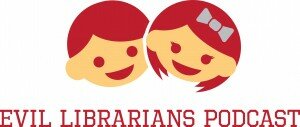 Today Tegan Davis is talking about her experience establishing a Digital Media Lab that now has a 3-D printer at the Park City Library. We talk process, policy, and procedure. Tegan also talks about her next adventure as she leaves Utah and the Park City Library for a new system, state, and type of librarianship! Tegan will continue her work on the Evil Librarians Podcast and Creative Libraries Utah, but she is off to greener pastures.
Today Tegan Davis is talking about her experience establishing a Digital Media Lab that now has a 3-D printer at the Park City Library. We talk process, policy, and procedure. Tegan also talks about her next adventure as she leaves Utah and the Park City Library for a new system, state, and type of librarianship! Tegan will continue her work on the Evil Librarians Podcast and Creative Libraries Utah, but she is off to greener pastures.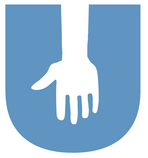
 Funding for the YouCreate Lab was provided by a grant from the Institute of Museum and Library Services through the Library Services and Technology Act, administered by the Utah State Library, Park City Municipality and by the Friends of the Park City Library.
Funding for the YouCreate Lab was provided by a grant from the Institute of Museum and Library Services through the Library Services and Technology Act, administered by the Utah State Library, Park City Municipality and by the Friends of the Park City Library.

